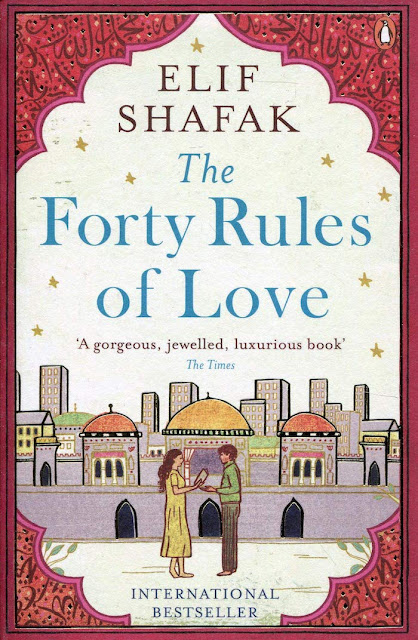Today I decided to share my review of the book' Forty Rules Of Love'.
But before sharing my perspective, I would like to bare my heart on what I felt when I read that novel. I felt like I was there, at that timeline. I enjoyed it so much that I learned all the forty rules from the depths of my heart.
Again; before sharing the review, I would highlight its summary a little bit.
Here it goes:
Book Summary: The Forty Rules of Love:
As the plot spreads out, Ella goes winds up spellbound with the story she is as of now scrutinizing and decides to take practices from the perspective of the forty guidelines of fondness, set somewhere near the Shams of Tabriz.
She is ultimately convinced, her relationship and lives are proposed to be changed by the essayist of the book, Aziz Zahara – much the same as Rumi's life changed by the Shams of Tabriz.
Now, comes my review:
Book Review: The Forty Rules of Love:
Ella Rubenstein, a melancholy forty-year-old housewife with a tricking life partner and three children; reliably such an individual your mother would underwrite of! She couldn't get a handle on why she had these questions. For the duration of the time, she has gotten vain with her anguished life, relinquishing fondness and assumption. She continues driving her regular daily existence, choking out herself with nuclear family tasks and evading conflicts.
Being a housewife for a significant drawn-out period of time, her life finally takes a turn when she should review a book – 'Sweet Blasphemy', as a few of her new position's responsibilities, as a theoretical observer. Since the time she read the chief sentence, the book ties her as its own. She sets the ball moving with a movement of real conversations through messages with believe it or not simply the maker Aziz Zahara.
"Each certifiable friendship and family relationship is a record of abrupt change. In case we are a comparable person when we revered, that suggests we haven't adequately treasured."
Set in the thirteenth century, it portrays the trip of a genuinely famous pair – Shams of Tabriz and Rumi.
Deceptions of Tabriz, a wandering dervish, and comprehensive Sufi, plots the forty rules of veneration which he awards to singular Sufi enthusiasts. By morals of his enrichment of having dreams about the future, he predicts his own death. He decides to give his understanding to someone at standard with him, someone as sincere and in love as he is by all accounts.
He takes off right to Baghdad to find Rumi, a minister with a disturbed soul. On the course of his allowing data, he faces scorn and disappointment from others, especially Rumi's family. Disregarding all odds and dangers, he shows the method of light and love to Rumi; in this manner crediting to his getting maybe the most sought-after Sufi and essayist, taking everything into account.
"In case we are a comparative person when we worshiped, that suggests we haven't adequately treasured."
Shafak, being an unfaltering lady dissident herself, guarantees her female characters are the most grounded and getting a handle on. The thirteenth-century plot is particularly polyphonic, thus controlling us to the various perspectives of people around and not just the Shams of Tabriz, be it the forlorn prostitute, the roadside untouchable, or the fledgling aide at a madrassa.
There are agent approaches between the plot in the thirteenth century and the one in current events – The time of social unsettling influence, people varying on exacting feelings of others, the forty guidelines with the age of the protagonist(and why it's the best an extraordinary time, in reality), the disturbing, lovelorn heart of Rumi as is Ella's, the controlling light that Shams is for Rumi, as Aziz is for Ella; and the basic aftereffects of these unknown affiliations. The plot with Ella is likely the more delicate story-line of the two; with simply Ella's thoughts being voiced and no of various characters in her everyday presence. This is a proposed examination for all refrain fans and Rumi admirers like me. This current one for the soul!












No comments: